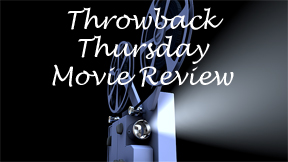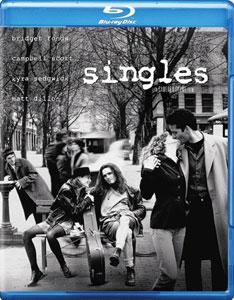Filmmakers generally don’t aim to create a time capsule when they make a contemporary film, but some turn out that way. A case in point is writer-director Cameron Crowe’s “Singles” (1992), the title of which has three meanings: 1) It explores what it’s like to be a single person in a time when it’s becoming less of a societal stigma, and dating is becoming scarier due to knowledge of STDs; 2) It’s set in an apartment complex of single-occupancy units, a notion that also worked for TV’s “Melrose Place” that year; and 3) It’s about music singles – particularly songs by Seattle bands at a time when hair metal is giving way to grunge, and lyrics are becoming more infused with meaning.
Hopeless romantics
“Singles” is a sweet-natured film where everyone is a hopeless romantic. There are no villains, and the conflicts are light. All of Crowe’s works are like this, but some have slightly bigger hooks, like “Almost Famous” (2000) being autobiographical, “Elizabethtown” (2005) being a stealth religious parable and TV’s “Roadies” (2016) digging into the concert-tour lifestyle.
“Singles” is about five Seattle 20-somethings looking for love; Crowe spices it up by splitting the movie into story chunks, each with a title, and by having the lovebirds talk to the camera now and then. These tricks neither add nor take away from the experience.

“Singles” (1992)
Director: Cameron Crowe
Writer: Cameron Crowe
Stars: Bridget Fonda, Campbell Scott, Kyra Sedgwick
As with “About Last Night …” (1986), the telephone is a prominent time-capsule element. Former radio DJ Steve (Campbell Scott) wants to call Linda (Kyra Sedgwick) – the one main character who doesn’t live in the building — because he really likes her, but his friends at the complex urge him to play it cool.
Of course, he plays it too cool, as his four-day wait to call makes Linda decide to play it cool also. When the answering machine eats Linda’s tape wherein Steve declares his love, a long time goes by before she comes to his door. Campbell’s line delivery of “What took you so long?” is perfect; follow it up with a timely pop song and it’s hard to not like “Singles.”
The story of Janet (Bridget Fonda) is the opposite of Steve’s. She is all over musician Cliff (Matt Dillon), who openly tells her that – although he likes her – he’s not exclusively dating her. Only when she breaks up with him does he realize what he had, and the tables turn. In non-Crowe movies, that probably would mean he blew it for good, but Crowe doesn’t do that to his characters; he’s an ole softie.
Happily ever after for everyone
There’s a happily ever after for everyone in “Singles,” including Debbie (fiery-haired Sheila Kelley, who has a Jessica Chastain quality here), whose story includes the weirdest time-capsule element: video dating. You create, via a studio specializing in the service, a video pitching yourself to potential dates. It gets mailed to people the service thinks will be compatible; you in turn receive videos.

Scott and Fonda are particularly good at walking the fine line that Crowe sets out: Steve and Janet are immature enough to wear their hearts on their sleeves (even though they try to hide it) yet mature enough to have jobs and live in tidy apartments. When Steve’s gets messy, it’s a sign that he’s extremely lovesick.
This was before the era of extended adolescence, and that might be why – although Steve is a former DJ who has a respectable vinyl record collection – he doesn’t talk about music. That’s kind of surprising for a Crowe film, but it wasn’t until eight years later that “High Fidelity” declared that it’s OK to be an adult music nerd.
Still, everyone goes to see Seattle bands throughout the film, and although they are unnamed in the screenplay, they include Alice in Chains and Soundgarden. Also prominent on the soundtrack are Pearl Jam, Mudhoney and the Smashing Pumpkins.
Heyday of the club scene
A fourth definition of “single” comes from Steve’s job with the Seattle transportation department. Cars without passengers are clogging up the roadways, and Steve pitches a rail project. He’s sure people will park and ride if the train experience includes good coffee and good music. The mayor (Tom Skerritt) tells Steve he’s wrong (people love their cars), and smartly saves taxpayers from a boondoggle. It’s goofy that the mayor is painted as a villain, but still, there’s something romantic about Steve’s idea.
Although “Singles” doesn’t by any means marginalize single people, it loves the idea of people getting together, in any form. If video dating or a city rail don’t do the trick in 1992, at least the club scene still does.

